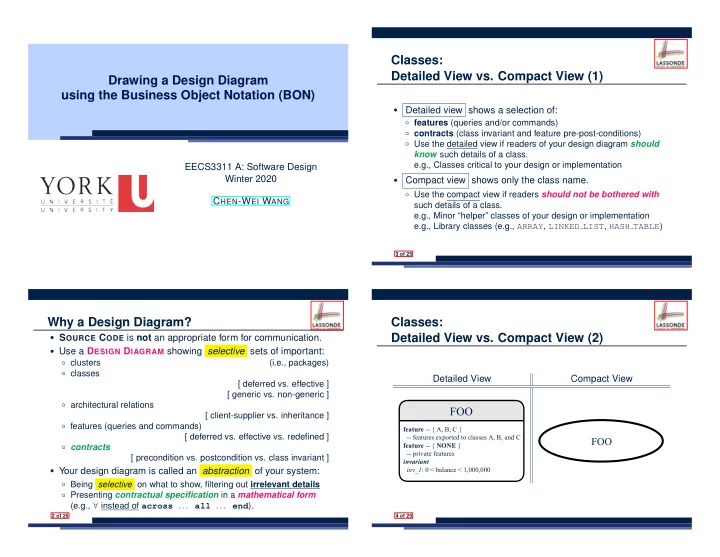

Classes: Detailed View vs. Compact View (1) Drawing a Design Diagram using the Business Object Notation (BON) Detailed view shows a selection of: ● ○ features (queries and/or commands) ○ contracts (class invariant and feature pre-post-conditions) ○ Use the detailed view if readers of your design diagram should know such details of a class. e.g., Classes critical to your design or implementation EECS3311 A: Software Design Winter 2020 Compact view shows only the class name. ● ○ Use the compact view if readers should not be bothered with C HEN -W EI W ANG such details of a class. e.g., Minor “helper” classes of your design or implementation e.g., Library classes (e.g., ARRAY , LINKED LIST , HASH TABLE ) 3 of 25 Why a Design Diagram? Classes: ● S OURCE C ODE is not an appropriate form for communication. Detailed View vs. Compact View (2) ● Use a D ESIGN D IAGRAM showing selective sets of important: ○ clusters (i.e., packages) ○ classes Detailed View Compact View [ deferred vs. effective ] [ generic vs. non-generic ] ○ architectural relations FOO [ client-supplier vs. inheritance ] ○ features (queries and commands) feat�re �--���A,�B,���� [ deferred vs. effective vs. redefined ] ��--������������������������������A,�B,������ FOO feat�re �--��� NONE �� ○ contracts ��--����������������� [ precondition vs. postcondition vs. class invariant ] in�arian� ● Your design diagram is called an abstraction of your system: �� in�_1 :�0�<���������<�1,000,000 ○ Being selective on what to show, filtering out irrelevant details ○ Presenting contractual specification in a mathematical form (e.g., ∀ instead of across ... all ... end ). 2 of 25 4 of 25
Contracts: Mathematical vs. Programming Deferred vs. Effective ○ When presenting the detailed view of a class, you should include contracts of features which you judge as important . ○ Consider an array-based linear container: A��A�ED�CON�AINE�+ �������� --�Q������ ��c���� + :� IN�EGER ������--� N���������������������������������a���� Deferred means unimplemented ( ≈ abstract in Java) �������� --�C���a�d� ��a�����_a� +� (�:� IN�EGER ;��:� ��RING ) ������ --� C�a���������a����a�����������'�'����'�'. Effective means implemented ���� ������� ������ �a���_����� :�1�������c���� ���� ������ ������ ����_����a���� :����.c�����=�( ��� ����.����).c���� ������ ����_a������� :����[�]���� ������ ������_����a���� :� ∀ ��:�1����������.c�����:������� ⇒ ���[�]���( ��� ����.����)�[�]��� ������� �--��� NONE �� ����� + :� ARRA� [ ��RING ] ����--� I��������a��������a��a��a���-����a���� in�arian� ��������������� :����.c�����=�c���� ● A tag should be included for each contract. ● Use mathematical symbols (e.g., ∀ , ∃ , ≤ ) instead of programming symbols (e.g., across . . . all . . . , across . . . some . . . , <= ). 5 of 25 7 of 25 Classes: Generic vs. Non-Generic Classes: Deferred vs. Effective ● A class is generic if it declares at least one type parameters. ● A deferred class has at least one feature unimplemented . ○ Collection classes are generic: ARRAY[G] , HASH TABLE[G, H] , etc. ○ A deferred class may only be used as a static type (for ○ Type parameter(s) of a class may or may not be instantiated : declaration), but cannot be used as a dynamic type. ○ e.g., By declaring list: LIST[INTEGER] (where LIST is a deferred class), it is invalid to write: HA�H��ABLE�G,�H� HA�H��ABLE����I�G,�I��EGE�� HA�H��ABLE��E����,�I��EGE�� ● create list.make ● create { LIST[INTEGER] } list.make ○ If necessary, present a generic class in the detailed form: ● An effective class has all features implemented . DA�ABA�E�G� DA�ABA�E����ING� DA�ABA�E��E��ON� ○ An effective class may be used as both static and dynamic types. feature � feature � ○ e.g., By declaring list: LIST[INTEGER] , it is valid to write: feature � ��--�������������������������� ��--�������������������������� ��--�������������������������� feature �--��� NONE �� feature �--��� NONE �� feature �--��� NONE �� ● create { LINKED LIST[INTEGER] } list.make ��--����:� ARRAY �G� ��--����:� ARRAY � STRING � ��--����:� ARRAY �PER�ON� in�arian� in�arian� in�arian� ● create { ARRAYED LIST[INTEGER] } list.make ��--�������������������������� ��--�������������������������� ��--�������������������������� where LINKED LIST and ARRAYED LIST are both effective ● A class is non-generic if it declares no type parameters. descendants of LIST . 6 of 25 8 of 25
Features: Deferred, Effective, Redefined (1) Features: Deferred, Effective, Redefined (3) ● A redefined feature re-implements some inherited effective A deferred feature is declared with its header only feature. (i.e., name, parameters, return type). ○ The word “ deferred ” means a descendant class would later class implement this feature. DATABASE_V2 [ G ] inherit ○ The resident class of the deferred feature must also be deferred . DATABASE_V1 [ G ] redefine search end deferred class feature -- Queries DATABASE [ G ] search ( g : G ): BOOLEAN feature -- Queries -- Perform a binary search on the database. search ( g : G ): BOOLEAN deferred end -- Does item ‘g‘ exist in database? end deferred end end ● A descendant class may still later re-implement this feature. 9 of 25 11 of 25 Features: Deferred, Effective, Redefined (2) Classes: Deferred vs. Effective (2.1) Append a star * to the name of a deferred class or feature. Append a plus + to the name of an effective class or feature. ● An effective feature implements some inherited deferred Append two pluses ++ to the name of a redefined feature. feature. ● Deferred or effective classes may be in the compact form: class DATABASE_V1 [ G ] inherit DATABASE LI���G�* LINKED�LI���G�+ ARRA�ED�LI���G�+ feature -- Queries search ( g : G ): BOOLEAN -- Perform a linear search on the database. deferred end LI���LI���PER�ON��* LINKED�LI���IN�EGER�+ ARRA�ED�LI���G�+ end ● A descendant class may still later re-implement this feature. DA�ABA�E�G�* DA�ABA�E��1�G�+ DA�ABA�E��2�G�+ 10 of 25 12 of 25
Recommend
More recommend